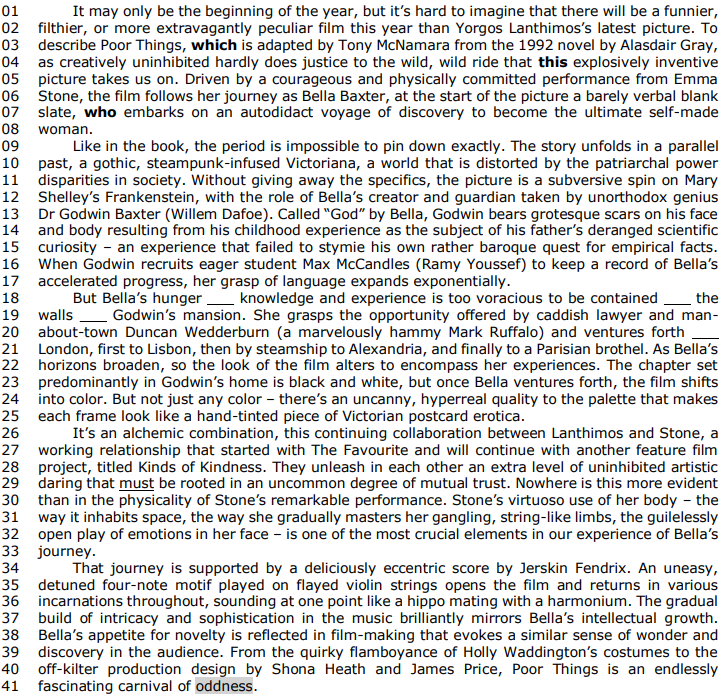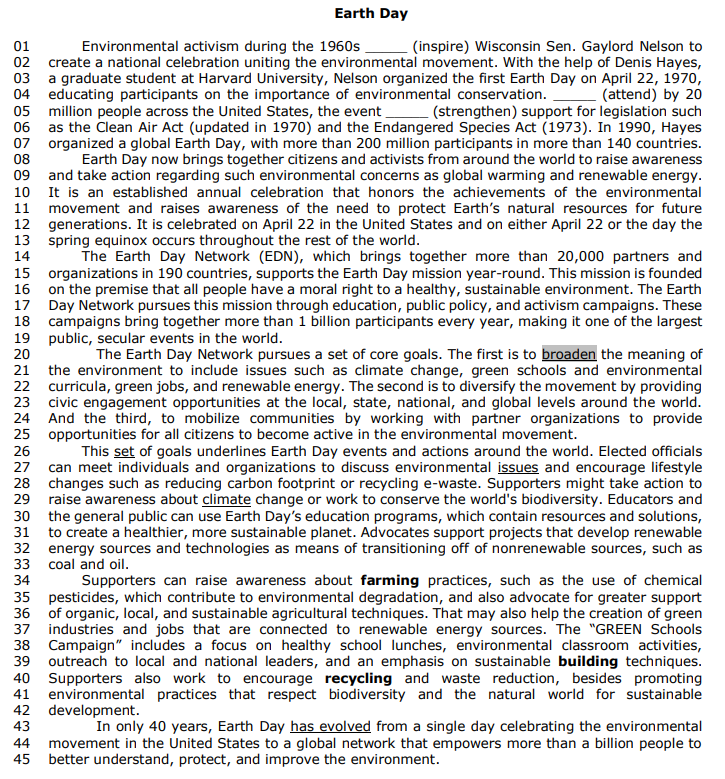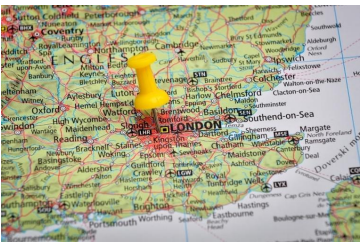Questões de Concurso
Sobre verbos | verbs em inglês
Foram encontradas 1.785 questões
Read Text I and answer question.
Text I
How to have a healthier relationship with your phone
A few years ago, a Google employee sent an email to thousands of her co-workers: What if for six weeks straight, you spent one night per week without technology? The email was from Laura Mae Martin, Google’s executive productivity adviser, a role that, among other things, was created to help staff members foster healthier relationships with their gadgets and apps. After she sent the note, Ms. Martin was flooded with responses from coworkers eager for a respite from some of the very products they helped build. Thousands of employees have since participated in the annual “No-Tech Tuesday Night Challenge,” said Ms. Martin.
The problem she was trying to solve isn’t unique to Google workers. One survey found that Americans say they spend too much time on their phones. But dramatic solutions – a digital detox, a phone downgrade or a complete exit from social media – may feel impractical.
Is it possible to have a healthy relationship with technology while still using it daily? Fortunately, according to experts, the answer is a resounding ‘yes’ and here are a few things you can try:
First, start with one simple question.
You know that urge you get to reach for your phone without realizing it? And then, before you know it, you’re an hour into a social media binge? If you want to peacefully coexist with technology, you need to get a handle on those impulses, said Richard J. Davidson, the founder and director of the Center for Healthy Minds at the University of Wisconsin-Madison. According to him, people should start by noticing when they have an urge to lift their phone or open social media on their browser window. By becoming conscious of what you’re about to do, you’re interrupting an automatic behavior and awakening the part of your brain that governs self-control, he added. As one research article suggests, awareness of your actions can help you rein in bad habits.
Secondly, take the “mobile” out of your mobile devices.
Dr. Anna Lembke, a professor of psychiatry and addiction medicine at Stanford University School of Medicine, said one of the biggest problems with smartphones is what she calls “texting while running to catch a bus.” Using our devices while we’re on the move – walking from meeting to meeting, taking a child to school or catching a bus – prevents us from being more engaged in our lives, Dr. Lembke said.
One way to create harmony with technology is to limit your phone use when you’re on the move. Headed out for a walk? Turn off your notifications. Going to grab a coffee? Leave your phone on your desk. If you’re feeling brave, try powering down your phone while in transit. It won’t buzz with notifications, text messages or phone calls, which Dr. Lembke said could help you focus on the world around you.
Last of all, make technology work for you.
One thing experts agree on: To forge a healthy relationship with technology, you need to be in control of it and not the other way around. Think about your gadgets as tools that you decide how to use.
“Make it work for you, not against you; whether it’s an email program or your dishwasher, it’s the intention behind how you’re using it that really makes the big difference”, said Ms. Martin, the productivity expert at Google.
(Adapted from:
https://www.nytimes.com/2024/03/21/well/social-media-phone-addiction.html)
Poor Things – Emma Stone transfixes in Lanthimos’s thrilling carnival of oddness

(Available at: www.theguardian.com/film/2024/jan/14/poor-things-review-yorgos-lanthimos-emma-stonefrankenstein – text specially adapted for this test).

(Available at: education.nationalgeographic.org/resource/earth-day/– text specially adapted for this test).

(Available at: education.nationalgeographic.org/resource/earth-day/– text specially adapted for this test).

(Available at: education.nationalgeographic.org/resource/earth-day/– text specially adapted for this test).
I. The verb “farm” is in its gerund form in line 34 because it follows the preposition “about”.
II. The verb “build” is in its gerund form in line 39 because it serves as an adjective for “techniques”.
III. The verb “recycle” is in its gerund form in line 40 because it follows the verb “encourage”.
Which ones are correct?
"Maybe next year, I ___ (participate in) an international education conference, and I ___ (develop) new curriculum materials."
"I ___ (implement) a new teaching strategy, and I ___ (notice) significant improvements in student engagement."
"Last year, I ___ (attend) a workshop on innovative teaching methods. I ___ (learn) new techniques and ___ (implement) them in my classes."
John: "What ___ (you/do) this Saturday?"
Mary: "I ___ (attend) a workshop on active learning methodologies."
Elephant Calf Separated From Herd in India is Reunited With Its Mother

(Available at: https://www.theguardian.com/world/2024/jan/03/elephant-calf-separated-from-herd-in-india-isreunited-with-mother – text especially adapted for this test).
Text 02
British Accents and Dialects: A Rough Guide

Have you ever tried to put on a British accent? The chances are the accent you’re trying to copy is ‘Received Pronunciation’, or standard English – also known as the Queen’s English. Received Pronunciation, or RP, is what most non-Brits are used to hearing as a British accent, often when you switch on the BBC or World Service.
But it’s called the Queen’s English for a reason – hardly anyone in the UK apart from the Queen speaks this way.
The truth is, although it may be called Standard English, it is anything but standard. The British Isles is made up many, many different accents and dialects – more than 37 dialects at the last count. A dialect is a Variety of a language that differs from the standard language, in this case RP. Dialects can vary regionally – depending on where in the country a person is from, as well as socially.
[…]
Types of British Accents – Cockney
This is one of the UK’s most famous dialects, and it goes hand in hand with London. It came about as the dialect of the London working classes, especially in the poorer East End of the city. The Cockney dialect also gave us Rhyming Slang, and you can still hear plenty of market traders round the East End shouting out in Cockney from their stalls. With the Cockney accent, there are lots of ‘glottal stops’, and the ‘th’ sound frequently changes to an ‘f’ sound. There have also been some famously terrible attempts at the Cockney dialect – here’s Dick Van Dyke to show you how not to do it!
Text adapted from: <https:englishlive.ef.com/en/blog/English-in-the-real-world/rough-guide-british-dialects/>
Text 3
Digital habits across generations
Today’s grandparents are joining their grandchildren on social media, but the different generations’ online habits couldn’t be more different. In the UK the over55s are joining Facebook in increasing numbers, meaning that they will soon be the site’s second biggest user group, with 3.5 million users aged 55-64 and 2.9 million over-65s.
Sheila, aged 59, says, ‘I joined to see what my grandchildren are doing, as my daughter posts videos and photos of them. It’s a much better way to see what they’re doing than waiting for letters and photos in the post. That’s how we did it when I was a child, but I think I’m lucky I get to see so much more of their lives than my grandparents did.’ Ironically, Sheila’s grandchildren are less likely to use Facebook themselves. Children under 17 in the UK are leaving the site – only 2.2 million users are under 17 – but they’re not going far from their smartphones.
Chloe, aged 15, even sleeps with her phone. ‘It’s my alarm clock so I have to,’ she says. ‘I look at it before I go to sleep and as soon as I wake up.’ Unlike her grandmother’s generation, Chloe’s age group is spending so much time on their phones at home that they are missing out on spending time with their friends in real life. Sheila, on the other hand, has made contact with old friends from school she hasn’t heard from in forty years. ‘We use Facebook to arrange to meet all over the country,’ she says. ‘It’s changed my social life completely.’ Teenagers might have their parents to thank for their smartphone and social media addiction as their parents were the early adopters of the smartphone. Peter, 38 and father of two teenagers, reports that he used to be on his phone or laptop constantly. ‘I was always connected and I felt like I was always working,’ he says. ‘How could I tell my kids to get off their phones if I was always in front of a screen myself?’ So, in the evenings and at weekends, he takes his SIM card out of his smartphone and puts it into an old-style mobile phone that can only make calls and send text messages. ‘I’m not completely cut off from the world in case of emergencies, but the important thing is I’m setting a better example to my kids and spending more quality time with them.’ Is it only a matter of time until the generation above and below Peter catches up with the new trend for a less digital life?
Source: https://learnenglish.britishcouncil.org
Analyze the sentences from text 3 below according to structure and grammar use.
1. The phrasal verb in: Unlike her grandmother’s generation, Chloe’s age group is spending so much time on their phones at home that they are missing out on spending time with their friends in real life. means in its context that they are not be able to experience an opportunity or chance.
2. The word Ironically, in bold in the second paragraph is being used as an adverb to express irony.
3. The reference words in bold in the first paragraph their and they, create cohesion that
precedes coherence.
4. In the following sentence from the third paragraph: Unlike her grandmother’s generation, Chloe’s age group is spending so… the (‘s) in grandmother’s and Chloe’s indicates the short form of the verb to be in the present tense.
5. The conjunctive adverb Unlike in bold in the third paragraph, is used to introduce a statement that contrasts with a previous statement.
Choose the alternative which contains the correct
sentences.
IS CHOCOLATE GOOD FOR HEALTH?
Yes, but only bitter and in small doses. Chocolate is one
of those foods that, throughout history, has alternated
its position in relation to its effects on health. At
sometimes, considered beneficial, in others, as harmful
to health.
https://www.medicalnewstoday.com/articles/270272
The words “small, its and health” are classified as:
Complete the sentences with the correct phrasal verbs:
- I _____________his phone number in my contacts list, but I didn't find it.
- I need you to _____________ my kids while I'm on vacation.
- _____________! The car is coming in your direction!
- I’m _____________ going to my favorite band's concert next week.